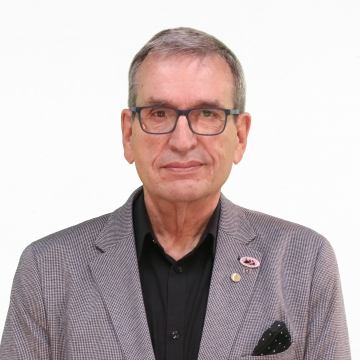
Rodrigo Martins é Professor Catedrático no Departamento de Ciência dos Materiais da NOVA School of Science and Technology, membro da Academia Portuguesa de Engenharia desde 2009 e membro da Academia Europeia de Ciências desde 2016. Foi condecorado com a medalha de ouro e mérito, distinção pela Câmara Municipal de Almada pelas suas realizações em I&D.
Actualmente é :
- Director do Centro de Excelência em Microelectrónica e Processos Optoelectrónicos do Instituto de Novas Tecnologias, CEMOP/Uninova;
- Chefe do grupo de Materiais para Electrónica, Optoelectrónica e Nanotecnologias (MEON) do CENIMAT/I3N;
- Presidente da Academia Europeia das Ciências - EurASc;
- Membro do Conselho Consultivo da Horizon 2020 da DG Investigação e Inovação (Materiais Avançados, Nanotecnologia, Biotecnologia e Fabrico);
- Presidente do Comité Europeu de Assuntos da Sociedade Europeia de Investigação de Materiais, E-MRS;
- Presidente do Comité do Prémio Global de Liderança e Serviços da International Union of Materials Research Societies, IUMRS;
- Vice-presidente de Energia, Iniciativa de Investigação da Indústria de Materiais, EMIRI;
.....
Rodrigo Martins tem estado envolvido na investigação europeia pioneira sobre semicondutores de silício amorfo e é pioneiro na actividade de grupo a nível mundial relacionada com óxidos passivos e activos, a chamada electrónica transparente e é um dos inventores da chamada electrónica de papel, onde o papel é explorado não só como um substrato mas também como um componente funcional em dispositivos activos.
R. Martins publicou mais de 700 artigos e nos últimos 10 anos recebeu mais de 14 prémios e distinções internacionais e nacionais pelo seu trabalho (por exemplo Lisbon Energy Live Expo, Prémio Inovação, 2012 (azulejos solares); nomeação 2016 do Instituto Europeu de Patentes Inovação (electrónica de papel); Prémio Exame Informática Inovação 2016 (células solares de papel) )
1. R. Martins, L. Pereira, E. Fortunato, SID 2014 Frontline Technology: The Future Is Paper Based, p20-24;
2. R. Martins, Pooling European Materials, interview, Science & Technology 10 (2014) pp. 106-108;
3. R. Martins, Europe welcomes Brazilian spirit, Science Impact, IOP, vol.5 (2014), p.9;
4. R. Martins, A. Ahnood, N. Correia, L. Pereira, R. Barros, P. Barquinha, R. Costa, I. Ferreira, A. Nathan, E. Fortunato, Recyclable, Flexible, Low-Power Oxide Electronics, Advanced Functional Materials 23 (17) (2013), pp. 2153-2161;
5. Book: Martins R., Fortunato E., Barquinha P., Pereira L. (2012). Transparent Oxide Electronics: From Materials to Devices. Wiley, ISBN: 978-0-470-68373-6.